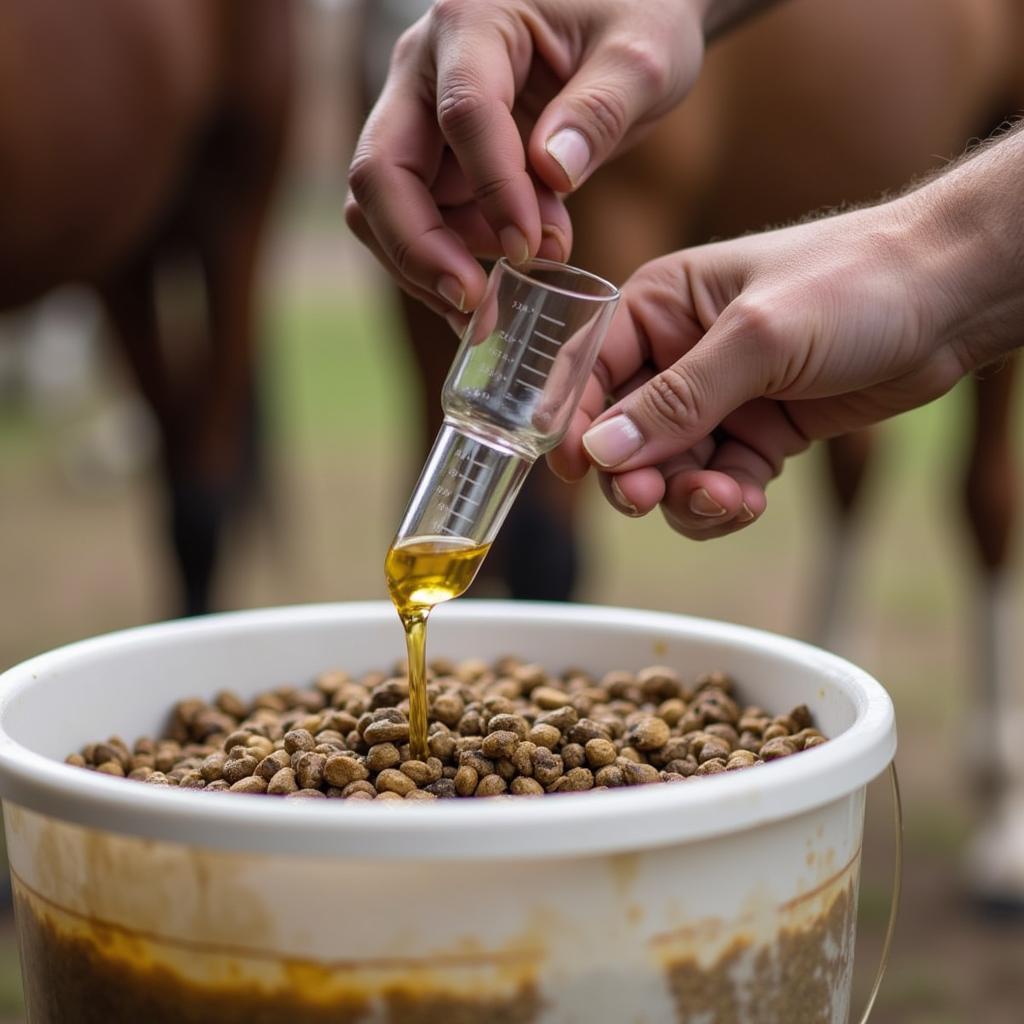Oil Horses benefit from greatly. Incorporating the right oils into a horse’s diet can have profound effects on their overall health, coat condition, and performance. This guide dives deep into the world of equine dietary oils, exploring the various types, benefits, and best practices for incorporating them into your horse’s feed.
Understanding the Benefits of Oil for Horses
Adding oil to a horse’s diet isn’t just a fad; it offers a multitude of benefits. Oils provide a concentrated source of energy, which is especially beneficial for performance horses or those needing to gain weight. They also contribute to a healthy, shiny coat, improve skin condition, and can even enhance the absorption of fat-soluble vitamins like A, D, E, and K. Certain oils also boast anti-inflammatory properties, supporting joint health and overall well-being.
Choosing the Right Oil for Your Horse
Not all oils are created equal when it comes to equine nutrition. Some of the most popular choices include corn oil, soybean oil, flaxseed oil, and rice bran oil. Each oil has a unique fatty acid profile, offering different benefits. For instance, corn oil and horses are a common pairing due to its palatability and high energy content. Other options, like flaxseed oil, are rich in omega-3 fatty acids, promoting anti-inflammatory effects. It’s crucial to research and select an oil that aligns with your horse’s specific needs and dietary requirements.
Exploring the Different Types of Horse Oils
Let’s take a closer look at some common oils for horses:
- Corn Oil: A readily available and affordable option, corn oil provides a good source of energy.
- Soybean Oil: Similar to corn oil in its energy content, soybean oil is also a palatable choice for many horses.
- Flaxseed Oil (Linseed Oil): Rich in omega-3 fatty acids, flaxseed oil is known for its anti-inflammatory benefits and can contribute to a healthy coat.
- Rice Bran Oil: Highly digestible and palatable, rice bran oil is a good source of antioxidants and Vitamin E.
How to Incorporate Oil into Your Horse’s Diet
Introducing oil gradually is key to avoiding digestive upset. Start with small amounts and slowly increase the quantity over several weeks. It’s important to mix the oil thoroughly with the feed to ensure even distribution and prevent the horse from picking it out. Always consult with your veterinarian or equine nutritionist to determine the appropriate amount and type of oil for your horse’s individual needs.
 Measuring Oil for Horse Feed
Measuring Oil for Horse Feed
Potential Risks and Considerations of Oil Horses
While oil offers many advantages, there are some potential risks to consider. Overfeeding oil can lead to weight gain, loose stools, and even metabolic issues. It’s crucial to monitor your horse’s weight and overall condition closely when incorporating oil into their diet. Additionally, some horses may be allergic to certain oils, so be vigilant for any signs of an allergic reaction, such as hives or itching.
CBD Oil for Horses: A Growing Trend
cbd oil for horses has gained popularity in recent years for its potential therapeutic benefits. While research is ongoing, some horse owners report positive effects on anxiety, pain management, and inflammation. However, it’s essential to choose high-quality CBD oil specifically formulated for horses and consult with a veterinarian before adding it to your horse’s regimen.
Camellia Oil for Horses: A Unique Option
Camellia oil for horses is a lesser-known option gaining traction for its high antioxidant content and potential benefits for skin and coat health. It’s also highly palatable and easily digested, making it a suitable choice for sensitive horses.
Oil Supplements for Horses: A Convenient Alternative
oil supplement for horses offer a pre-measured and convenient way to incorporate oil into your horse’s diet. These supplements often combine different oils and may include added vitamins and minerals for a comprehensive nutritional boost.
In conclusion, oil horses can thrive with the addition of beneficial oils to their diets. From enhanced energy levels and a gleaming coat to improved joint health, the right oil can make a significant difference. By carefully selecting the appropriate oil and following best practices for incorporation, you can support your horse’s overall health and well-being. Remember to consult with your veterinarian or equine nutritionist for personalized guidance on choosing the best oil for your horse.
FAQ:
- What type of oil is best for my horse?
- How much oil should I give my horse?
- Can oil help my horse gain weight?
- Are there any risks associated with feeding oil to horses?
- What are the signs of an oil allergy in horses?
- Can I feed my horse vegetable oil?
- How do I introduce oil into my horse’s diet?
Other questions we often receive:
- What are the benefits of adding oil to horse feed?
- How can I tell if my horse is benefiting from oil supplements?
- What are some signs that my horse is getting too much oil?
Other relevant articles on Justus Horses USA:
- Equine Nutrition Basics
- Horse Coat Care
- Understanding Horse Supplements
For any further assistance, please contact us at Phone Number: 0772127271, Email: [email protected] Or visit our address: QGM2+WX2, Vị Trung, Vị Thuỷ, Hậu Giang, Việt Nam. We have a 24/7 customer support team.